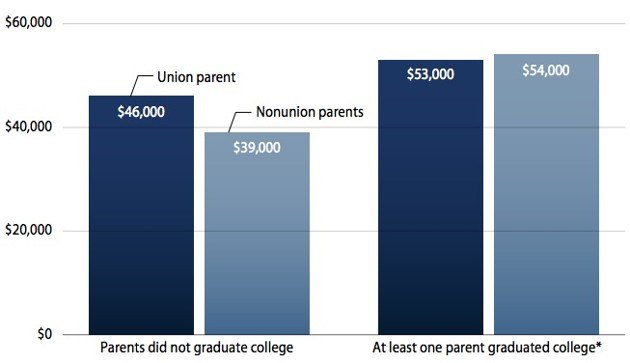Unions 30 Years Ago Are Somehow Making People Richer Today

People whose parents were in the labor movement decades ago are earning more today than those whose parents were not. Why?
Rebecca J. Rosen
Union membership has its perks: higher wages, better healthcare, more job security. Now, a new study from the Center for American Progress, a left-leaning think tank, adds another benefit to that list: richer children, once they’re all grown up.
According to the study, people between the ages of 26 and 37 who are working full time and whose parents did not go to college and were not in a union earn an average of $39,000 today. But a very similar group of people—everything the same except that they had one parent who was in a union—those people are earning $46,000. (The difference all but disappears when comparing people who had a parent who was a college graduate.)
Is this just because union households earned more, and thus were able to provide their kids with better educations, resources, and so on?
That doesn’t seem to be the case. The authors—Richard Freeman of Harvard, Eunice Han of Wellesley, and David Madland and Brendan V. Duke of CAP—tease this out by comparing people whose fathers were in unions with those whose fathers weren’t, while holding other demographic factors such as education, age, race, and occupation constant. They find that “having a father in a union is an 18.7 percent increase in a child’s earnings, an effect that is significant at the 1 percent level.”
Then they run the same calculation, this time holding income constant “to examine if there are other ways that parents’ union status affects mobility outside of higher parental incomes.” The answer is yes—something besides the income boost is generating this disparity. “Based on the findings,” they write, “a union father still increases an offspring’s income by a statistically significant 16.4 percent.” In other words, the additional income that comes with being a union member does not seem to be largely responsible for the difference in kids’ long-term welfare.
What is it about unions that is apparently boosting—decades later—the incomes of kids who grew up in union households? The authors are careful to point out that their findings are not causal; in an ideal world, they write, they’d have a natural experiment or be able to assign people at random to unions, but since that’s implausible, the best they’ve got is this (still quite compelling) correlation.
One possible explanation is that the other perks of union membership have long-term payoffs for kids. High-quality healthcare is critical not only for the immediate benefit of access to doctors and care but because the financial wreckage of a medical crisis sans insurance can drag a family down for decades. The benefit of job stability—especially for workers without much education, who may have trouble finding work following a layoff—is clear for parents, but for kids too, the value of having household financial stability is enormous. (This perhaps explains why the difference between union and non-union households where a parent did have a college education was so slim—the college-educated households may have been better equipped to recover from job loss quickly, resulting in less instability for kids.)
Lastly, the authors speculate that unions’ political power can also play a role, which may partially explain another finding: that all children, not just those who grow up in union homes, seem better off in high-union-density metro areas. As the authors write, “Unions generally advocate for policies that benefit all working people—such as minimum-wage increases and increased expenditures on schools and public services—that may especially benefit low-income parents and their children.
[Source]: The Atlantic


